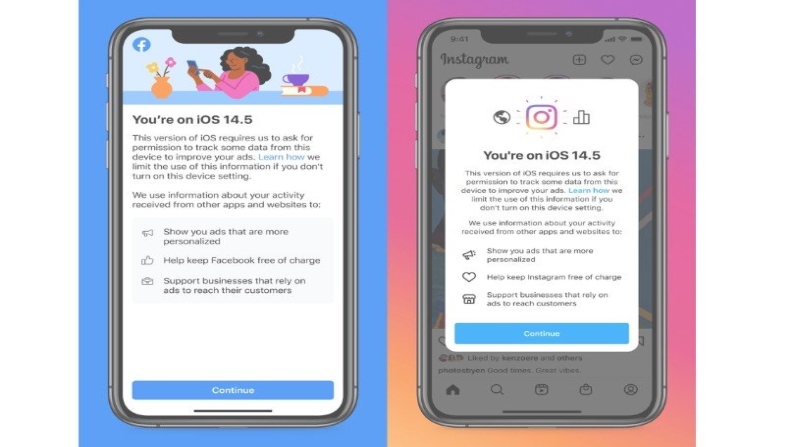iPhone users can be charged to use Facebook & Instagram soon
With the new app tracking transparency feature, more iOS users will become aware of how apps treat their data. They need to choose between privacy and cost
- Noopur Praveen
- Last Updated : May 5, 2021, 14:07 IST

The app tracking transparency feature launched by Apple during the recent unveiling of iOS 14.5 hasn’t gone too well with social networking giant Facebook. The app, reportedly, started pushing notifications to select people in the west to allow the company to track user data or the apps might charge money to use them.
Stating that Apple’s new feature can be harmful to small businesses, Facebook co-founder Mark Zuckerberg said these companies are already struggling to stay afloat amid the covid-19 outbreak.
“Facebook is speaking up for small businesses. Apple’s new iOS 14 policy will have a harmful impact on many small businesses that are struggling to stay afloat and on the free internet that we all rely on more than ever,” the company said in a blog.
Apple has been positioning itself as a privacy-as-a-service company, with a strong focus on infusing privacy into its products and services ecosystem. In doing so, it is providing consumers with more choice, and greater control over who has access to their data and what’s being done with it.
“As a result of the new privacy feature, consumers on iOS will start getting permission requests from apps that they probably assumed was never tracking them. Going forward, users will have the choice to grant or deny access to apps to track their data including personal identifiers, such as age, location, spending habits, among others. All this would translate into heightened consumer understanding around complex issues of security and privacy in the app economy,” Prabhu Ram, Head of Industry Intelligence Group (IIG) at Cyber Media Research told Money9.
Apple’s move will mean those small third-party businesses will no longer be tracked, and target users with hyper-personalized advertising. Small app companies offering free services will be affected the most as they’ll lose out on revenue from ads. To compensate, these apps will have to request subscription fees.
“One solution would be that they (third party apps) could leverage artificial intelligence and machine learning to serve users with contextually relevant ads, based on the content that consumers are consuming during app sessions. This would be a privacy-friendly move, as it does not entail collecting personal user data,” Ram said.
Meanwhile, Facebook remains adamant about the company’s stand against the tracking feature. It aims to provide more information to users on how the app uses personalized ads to support small businesses.
“To help people make a more informed decision, we’re also showing a screen of our own, along with Apple’s. It will provide more information about how we use personalized ads, which support small businesses and keep apps free. If you accept the prompts for Facebook and Instagram, the ads you see on those apps won’t change. If you decline, you will still see ads, but they will be less relevant to you,” the company’s blog read further.

Facebook also said that agreeing to these prompts will only help the app give a better experience to the users. Now if you choose not to share your user data, the company might just be forced to charge you a fee to continue using the app eventually.
This probably means iPhone users may need to pay a price for data protection while using apps like Facebook and Instagram. Or else, they can choose to allow these apps to track the user movement.
Until now, consumers, by and large, have not been cued in on data privacy and security implications. With the new app tracking transparency feature, more iOS users will become aware of how apps treat their data.
“As consumers benefit from increasing awareness around privacy issues, they will expect, seek and demand more control over their personal data,” Ram asserted.
Download Money9 App for the latest updates on Personal Finance.
Related
- भारत का एआई बाजार 2027 तक तीन गुना होकर 17 अरब अमेरिकी डॉलर होगा: रिपोर्ट
- गूगल ने आधिकारिक ऑनलाइन गूगल स्टोर के जरिये भारत में पिक्सल उपकरणों की सीधी बिक्री की शुरू
- एप्पल आने वाले वर्षों में अपने सभी मोबाइल फोन भारत में बनाएगा और यहीं से खरीदेगा: सिंधिया
- इन 5 स्टेप में खुल जाएगा Whatsapp Business अकाउंट, फ्री में चलता है ऐप; जानें इसके फीचर्स
- TikTok को खरीदने की तैयारी में हैं Microsoft… अब होगा ‘बिडिंग वॉर’?
- ‘बैटरी कम, तो किराया अधिक’ इस आधार पर भी बढ़ता-घटता है Uber का किराया! आया नया मामला

